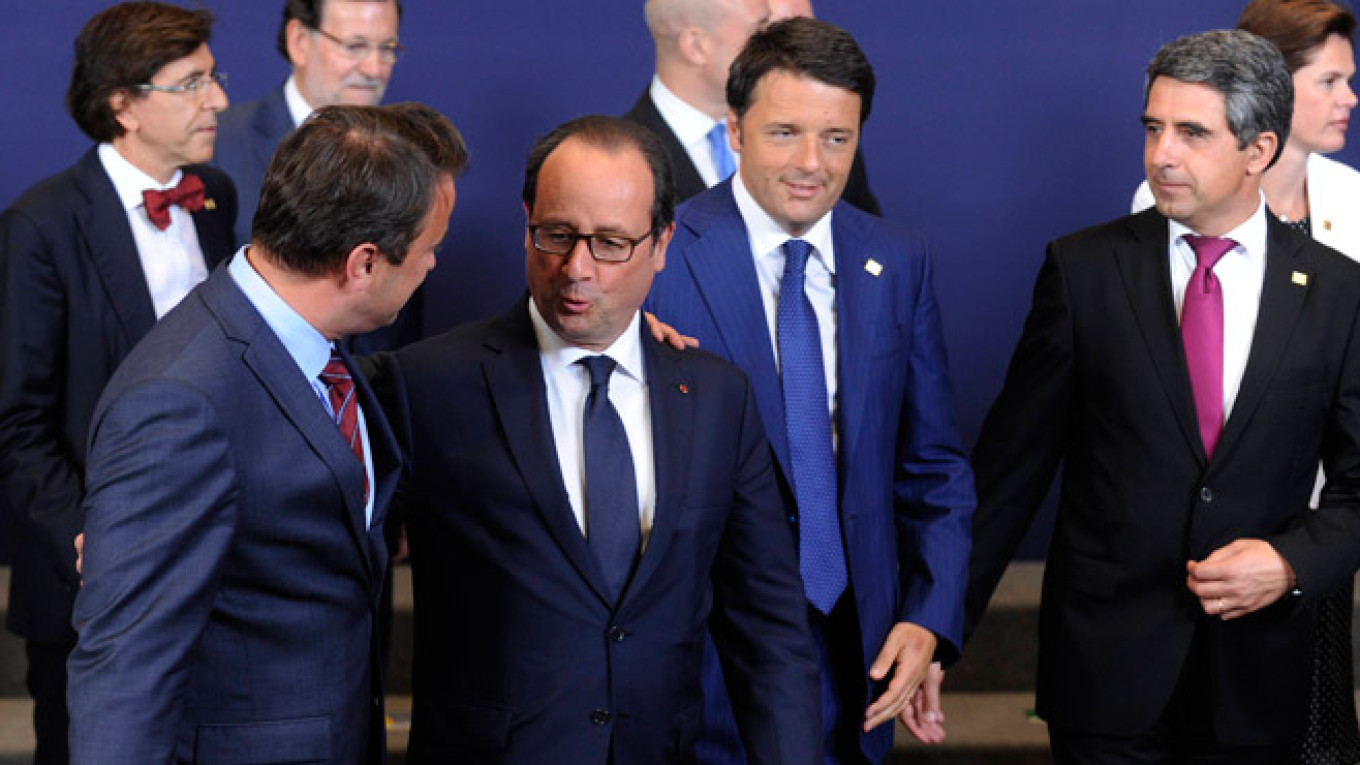BRUSSELS — The EU adopted new sanctions against Russia over its involvement in the Ukraine war on Monday, but delayed enforcing them to leave time to assess whether a cease-fire in Ukraine is holding.
The sanctions, which target the ability of Russia's top oil producers to raise capital in Europe, were originally due to take effect on Tuesday.
But that was pushed back by a few days after some EU governments suggested that new sanctions be put on hold to give a chance to a shaky cease-fire in eastern Ukraine.
Some EU countries opposed to further punishment of Moscow see the cease-fire, which was declared Friday and still largely intact on Monday, as an opportunity to block the new EU sanctions package and avoid retaliation from Russia, diplomats said.
"The entry into force [of the new sanctions] through the publication in the Official Journal will take place in the next few days. This will leave time for an assessment of the implementation of the cease-fire agreement and the peace plan," EU Council president Herman Van Rompuy said in a statement.
"Depending on the situation on the ground, the EU stands ready to review the agreed sanctions in whole or in part," he said after EU ambassadors held an extraordinary meeting to thrash out the issue.
An EU diplomat said there was no clarity on when the new sanctions would take effect. Ambassadors would probably discuss the issue next on Wednesday.
Hinting at disunity in the EU, the diplomat said it would require "political" support for the sanctions to take effect, suggesting that ambassadors would have to escalate the issue to a higher level of their governments.
A deadline for EU governments to agree to the new sanctions had earlier been pushed back.
Divisions
The EU has always been divided over sanctions on Russia, with countries such as Poland and the Baltics taking a hard line while the prime ministers of Hungary and Slovakia have been publicly hostile to sanctions.
At Monday's ambassadors' meeting, some EU governments wanted to discuss whether the new sanctions should be frozen before being implemented because of the cease-fire in Ukraine, or alternatively if the new sanctions were implemented, how they could be suspended and when.
The EU has always said its sanctions would be reversible if Russia stopped destabilizing Ukraine. Moscow annexed Ukraine's Crimea region in March and NATO says it has sent several thousand troops to help pro-Moscow separatists in the eastern part of the country.
Austria, Finland, Sweden, Cyprus and Slovakia were among countries wanting to give the cease-fire more time, according to one EU diplomat.
The cease-fire in Ukraine is part of a peace plan intended to end a five-month conflict that the UN human rights envoy said had killed more than 3,000 people.
The truce was largely holding on Monday, though each side accused the other of sporadic shelling, including in Mariupol, a city of about half a million people.
German Chancellor Angela Merkel told conservative members of parliament in a closed-door meeting in Berlin on Monday that the sanctions were needed despite the cease-fire agreement, according to several participants.
Merkel told the deputies Russia had already deceived the West repeatedly with broken promises and she pointed out that Russian troops are still in Ukraine, they said. The EU had to act decisively now, Merkel was quoted as saying.
The proposed new EU sanctions put Russia's top oil producers and pipeline operators Rosneft, Transneft and Gazprom Neft on a list of Russian state-owned firms that will not be allowed to raise capital or borrow on European markets, an EU diplomat said earlier.
Gazprom Excluded
EU sanctions, however, do not include the gas sector and in particular state-owned Gazprom, the world's biggest gas producer and the biggest gas supplier to Europe.
In general, the EU sanctions on Russian companies raising money in the European Union will apply to firms that have turnover of more than 1 trillion rubles ($26.95 billion), half of which is generated from the sale or transport of oil, the diplomat said.
A further 24 people will be added to a list of those barred from entry to the bloc and whose assets in the EU are frozen.
Details of the new sanctions would only be made public when published in the EU's Official Journal.
The list is expected to include new separatist leaders in eastern Ukraine, the government of Ukraine's Crimea region annexed by Moscow, and Russian decision-makers and oligarchs.


